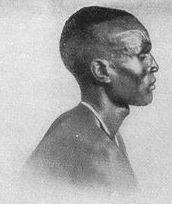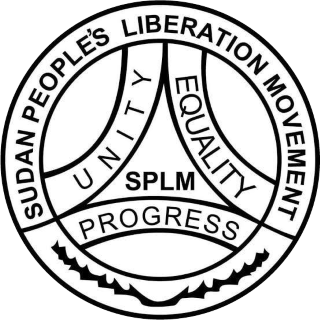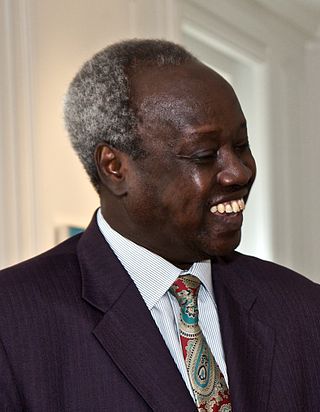Dinka spirituality refers to the traditional religion of the Dinka people, an ethnic group of South Sudan. They belong to the Nilotic peoples, which is a group of cultures in Southern Sudan and wider Eastern Africa. The Dinka people largely rejected or ignored Islamic teachings, as Abrahamic religious beliefs were incompatible with their society, culture and traditional beliefs.

The Dinka tribe are a Nilotic ethnic group native to South Sudan with a sizable diaspora population abroad. The Dinka mostly live along the Nile, from Jonglei to Renk, in the region of Bahr el Ghazal, Upper Nile, and the Abyei Area of the Ngok Dinka in South Sudan.

John Garang de Mabior was a Sudanese politician and revolutionary leader. From 1983 to 2005, he led the Sudan People's Liberation Army (SPLA) after the Second Sudanese Civil War, the comprehensive peace agreement of 2005 was signed and he briefly served as First Vice President of Sudan for 3 weeks until his death in a helicopter crash on July 30, 2005. A developmental economist by profession, Garang was a major influence on the movement that led to the foundation of South Sudan.

Salva Kiir Mayardit, also known as Salva Kiir, is a South Sudanese politician who has been the President of South Sudan since its independence on 9 July 2011. Prior to independence, he was the President of the Government of Southern Sudan, as well as First Vice President of Sudan, from 2005 to 2011. He was named Commander-in-Chief of the Sudan People's Liberation Army (SPLA) in 2005, following the death of John Garang.

The Sudan People's Liberation Movement is a political party in South Sudan. It was initially founded as the political wing of the Sudan People's Liberation Army in 1983. On January 9, 2005 the SPLA, SPLM and Government of Sudan signed the Comprehensive Peace Agreement, ending the civil war. SPLM then obtained representation in the Government of Sudan, and was the main constituent of the Government of the then semi-autonomous Southern Sudan. When South Sudan became a sovereign state on 9 July 2011, SPLM became the ruling party of the new republic. SPLM branches in Sudan separated themselves from SPLM, forming the Sudan People's Liberation Movement-North. Further factionalism appeared as a result of the 2013-2014 South Sudanese Civil War, with President Salva Kiir leading the SPLM-Juba and former Vice President Riek Machar leading the Sudan People's Liberation Movement-in-Opposition.

The SPLA-Nasir was a splinter faction of the Sudan People's Liberation Army (SPLA), a rebel group that fought in the Second Sudanese Civil War. Originally created as an attempt by the Nuer tribe to replace SPLA leader John Garang in August 1991, it gradually became coopted by the government. The break away of Riek Machar from SPLM/A resulted in Nuer ethnic group massacring Garang's ethnic Dinka from Bor in the Bor massacre in 1991. This split resulted in the 1994 National Convention of New Sudan in Chukudum.
Marc R. Nikkel (1950–2000) was an American Episcopal priest, artist, author, teacher, missionary to the Sudan, and advocate for the Dinka ("Jieng") people of South Sudan.

Rebecca Nyandeng of Mabior is a South Sudanese politician. She has been one of the Vice Presidents of South Sudan in the unity government since February 2020. She served as the Minister of Roads and Transport for the autonomous government of Southern Sudan, and as an advisor for the President of South Sudan on gender and human rights from 2007 to 2014. She is the widow of Dr. John Garang de Mabior, the late first Vice President of Sudan and the President of the Government of South Sudan, and the mother of Akuol de Mabior. She is from the Dinka tribe of Twic East County of South Sudan.
Abel Alier Kwai is a South Sudanese politician and judge who served as Vice President of Sudan between 1971 and 1982 and as President of the High Executive Council of the Southern Sudan Autonomous Region between 1972 and 1978. After Sudan gained independence from the United Kingdom in 1956, Southern Sudan was not left as an independent state. This led to a deadly war a year before the independence. A party in the war was Anyanya 1 Under Joseph Lagu. Abel Alier was a politician who managed to complete his college education among many Southern Sudanese. He is an internationally respected judge, human-rights lawyer and activist on behalf of Christians in the Sudan. Former Vice President of Sudan (1971–1982), he served as the first president of the High Executive Council of Southern Sudan. He sits on the Permanent Court of International Arbitration in The Hague and is recognized as Sudan's most prominent Christian lawyer. His latest book is Southern Sudan: Too Many Agreements Dishonoured.
William Nyuon Bany was a Southern Sudanese politician who was also one of the founders of the Sudan People's Liberation Army (SPLA). He was appointed third in command after John Garang and Kerubino Kuanyin Bol. While he worked as a commander of the SPLA he lived in Itang, a small Ethiopian town in the Gambela Region. In September 1992 he defected from the SPLA to join another faction under Riek Machar, but he rejoined the SPLA before he was assassinated on 13 January 1996.

Lieutenant General Nhial Deng Nhial is a South Sudanese politician and a member of the ruling Sudan People's Liberation Movement (SPLM). He was Minister of Foreign Affairs 2011 to 2013 and 2018 to 2019 after having served as the caretaker Minister of Defense since 10 July 2011. Prior to that he served as the pre-independence South Sudanese Minister of SPLA and Veteran Affairs, from 22 December 2008 until 9 July 2011.

The Abyei Area is an area of 10,546 km2 or 4,072 sq mi on the border between South Sudan and the Sudan that has been accorded "special administrative status" by the 2004 Protocol on the Resolution of the Abyei Conflict in the Comprehensive Peace Agreement (CPA) that ended the Second Sudanese Civil War. The capital of the Abyei Area is Abyei Town. Under the terms of the Abyei Protocol, the Abyei Area is considered, on an interim basis, to be simultaneously part of both the Republic of South Sudan and the Republic of the Sudan, effectively a condominium.
Twic East County is a county located in Jonglei State, South Sudan. Its headquarters were located at Panyagor. In May 2016, Twic East County was divided into Twic North County, Kongor County, Twic Center County, and Twic South County.

South Sudan is home to around 60 indigenous ethnic groups and 80 linguistic partitions among a 2021 population of around 11 million. Historically, most ethnic groups were lacking in formal Western political institutions, with land held by the community and elders acting as problem solvers and adjudicators. Today, most ethnic groups still embrace a cattle culture in which livestock is the main measure of wealth and used for bride wealth.
Kerubino Kuanyin Bol was one of the founders of the Sudan People's Liberation Movement (SPLM) and one of the leaders of the Sudan People's Liberation Army (SPLA) during the Second Sudanese Civil War (1983-2005). He was said to have fired the first shot in that conflict, which flared up when the Khartoum government of Sudan imposed Islamic law, or Sharia, across the whole country, including the southern region which in 2011 became the Republic of South Sudan. The people in this region mainly follow the Christianity and/or a traditional animist religion.
Ethnic violence in South Sudan has a long history among South Sudan's varied ethnic groups. South Sudan has 64 tribes with the largest being the Dinkas, who constitute about 35% of the population and predominate in government. The second largest are the Nuers. Conflict is often aggravated among nomadic groups over the issue of cattle and grazing land and is part of the wider Sudanese nomadic conflicts.
The Luwo are a Nilotic ethnic group that live in the western parts of South Sudan. They are part of a larger group of ethno-linguistically related Luo peoples of East Africa. They speak the Jur language which is a Northern Luo language.

The Dinka–Nuer West Bank Peace & Reconciliation Conference of 1999 was held in what was then the Southern part of Sudan. It is commonly called the "Wunlit Peace Conference" after Wunlit, the village where it was held in eastern Tonj County in Bahr El Ghazal. The conference brought together Nuer from Western Upper Nile and Dinka from Tonj, Rumbek, and Yirol. It is the most prominent and comprehensively documented case of a people-to-people peace process in what is now the Republic of South Sudan.
Hussein Abdelbagi Akol Agany is one of the vice presidents of South Sudan. Abdelbagi is a Malual Dinka from Northern Bahr el Ghazal. Abdelbagi, born in the late 1960s, was a son of the politically influential Malual Dinka tribal leader Sultan Abdelbagi Akol (1928-2020), who was among other things considered the spiritual head of the South Sudanese Muslims. Gen. Abdelbagi was the Chief of General Staff of the South Sudan Patriotic Army, which became part of the South Sudan Opposition Alliance. On August 25, 2018, the SSPM/A split, with Abdelbagi creating a faction that claimed to have removed Costello Garang Ring for rejecting the peace process and attacking communities on the border with Sudan. On July 23, 2019, the SSPM/A faction of Costello Garang Ring claimed to remove Abdelbagi from office. He became the speaker of the South Sudan Opposition Alliance faction led by Gabriel Changson Chang after it split in November 2018. As part of the unity government deal the SSOA was allowed to pick one out of the five vice presidents. The SSOA failed to decide on a vice president, so they authorized president Salva Kiir to pick from a list of six leaders. On February 23, 2020, Kiir picked Abdelbagi, making him the fifth vice president. Abdelbagi is the first Muslim Vice President of South Sudan and the highest ranking Muslim to be a part of any government in South Sudan.
Deng is also a common first or last name used among the tribes of South Sudan, shared by the Dinkas, Nuers and Shilluks. It has various meanings; for instance, it means "Rain" in Dinka. The Dinkas also believe that the most powerful god, ruler of all gods, is Deng.









